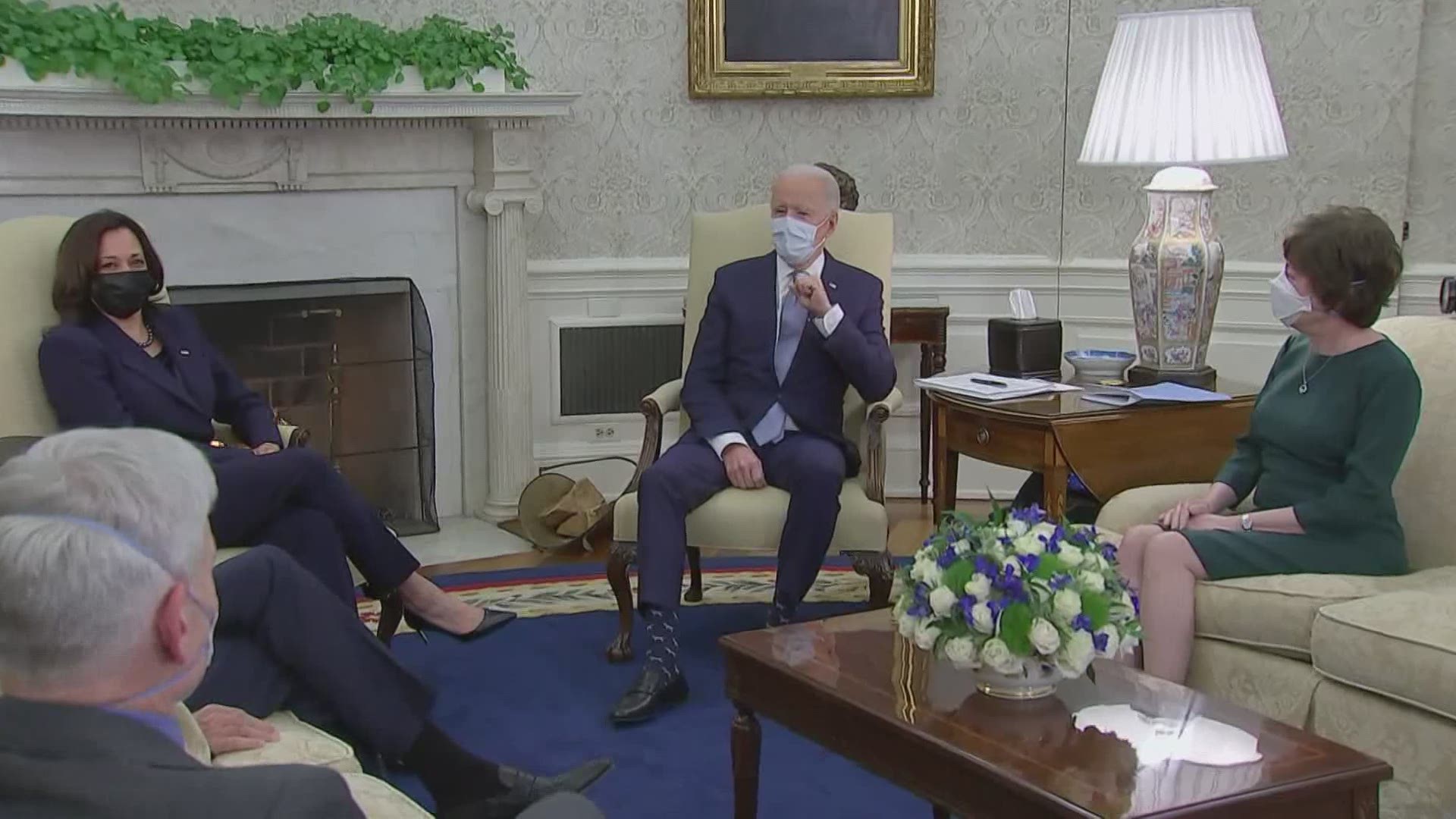WASHINGTON, D.C., USA — Following what Maine Sen. Susan Collins called a “very productive, cordial meeting” with President Joe Biden on Monday, the GOP group of senators is digging in their heels that Biden’s COVID-19 relief package proposal is too big, but “in the spirit of continuing to have an open and productive dialogue,” are providing feedback on Biden’s plan.
In their review of Biden’s $1.9 trillion plan, the group of 10 senators, led by Collins, say they still have “significant questions” about the plan’s size and scope.
The group—comprised of Sens. Collins, Lisa Murkowski (R-Alaska), Bill Cassidy (R-La.), Mitt Romney (R-Utah), Rob Portman (R-Ohio), Shelley Moore Capito (R-W. Va.), Todd Young (R-Ind.), Jerry Moran (R-Kan.), Mike Rounds (R-S.D.), and Thom Tillis (R-N.C.)—outline areas of agreement and disagreement in the letter to Biden, sent on Thursday.
The senators say the relief package should focus on the immediate health needs of the country, saying that’s why their alternative $618 billion plan includes Biden’s proposal for $160 billion for Direct COVID Pandemic Response, $50 billion to expand testing and $20 billion to accelerate vaccination efforts.
Collins and other Republican senators have opposed Biden’s plan, saying there is money from the recent $900 billion relief package that hasn’t yet been spent.
“For example, we understand that as of January 22, 2021, the Centers for Disease Control and Prevention (CDC) had only distributed $3 billion of the $8.75 billion appropriated for vaccine distribution, and nearly $14 billion in previously appropriated funding for COVID-19 testing had still not been obligated,” the senators wrote.
RELATED: 'Very productive, cordial meeting': Collins-led GOP group meets with Biden on COVID-19 relief
But there are things they agree should be included in the package, such as funding to reopen schools, “which is why we supported more than $113 billion last year for education at all levels, including nearly $68 billion for K-12 schools and students,” they said.
However, they again point to funds that have been directed to states for education purposes.
“[N]early $7 billion was directed to governors to meet education needs in their states, of which only $1.5 billion has been spent. Several governors also directed aid from the Coronavirus Relief Fund to their education systems,” the senators wrote. “To provide states with more flexibility, in December 2020, Congress extended the deadline for spending those funds to December 31, 2021.”
“We have significant questions, therefore, about the size and scope of what is proposed in the American Rescue Plan given the amounts already appropriated by Congress and the more than $60 billion in emergency funding that remains unspent by states and school districts for K-12 schools,” they said.
The senators remain firm on their stance that families making up to $300,000 per year don’t need stimulus payments.
Under the GOP proposal, $1,000 direct payments would go to individuals earning up to $40,000 a year, or $80,000 for couples. The proposal would begin to phase out the benefit after that, with no payments for individuals earning more than $50,000, or $100,000 for couples. That’s less than Biden’s proposal of $1,400 direct payments at higher income levels.
In the review, the senators said, “We want to help struggling lower- and middle-income families as well as boost the economy; better targeting the direct payments would accomplish both goals.”
On Wednesday, Biden told House Democrats he doesn’t want to budge from his proposed $1,400 direct payments he promised Americans.
“I’m not going to start my administration by breaking a promise to the American people,” Biden said.
On Thursday, the Senate voted 99-1 to pass an amendment to the budget resolution introduced by Collins and Sen. Joe Manchin, D-W.Va., to target stimulus checks to low- and middle-income families who need assistance as opposed to upper-income taxpayers.
“It is very unlikely that American households with family incomes of $300,000 have suffered significant financial harm as a result of the COVID-19 pandemic,” Collins said. “Our amendment ensures that this much-needed financial relief gets in the pockets of the struggling families that need it most.”
“American families in every corner of our country are struggling right now. Instead of sending stimulus checks to families who earn $300,000 a year we should be targeting this relief to families and individuals who need it most. For those who are struggling to pay rent or to put food on the table this $1,400 will make a significant impact on their ability to get by. These families need our support right now," Manchin said.
Biden also told Democrats he’s “not married” to an absolute number on his plan, but Congress “needs to act fast” on relief. During his meeting with Democrats, Biden panned that the $618 billion alternative is insufficient, but he is continuing to have private talks with Republicans on potential areas of compromise.
“I think we’ll get some Republicans,” he said during the meeting.
“We want to do it bipartisan, but we must be strong," Senate Majority Leader Chuck Schumer said after the 90-minute session at the White House. Democrats are "working with our Republican friends when we can.”
The Associated Press contributed to this report.

